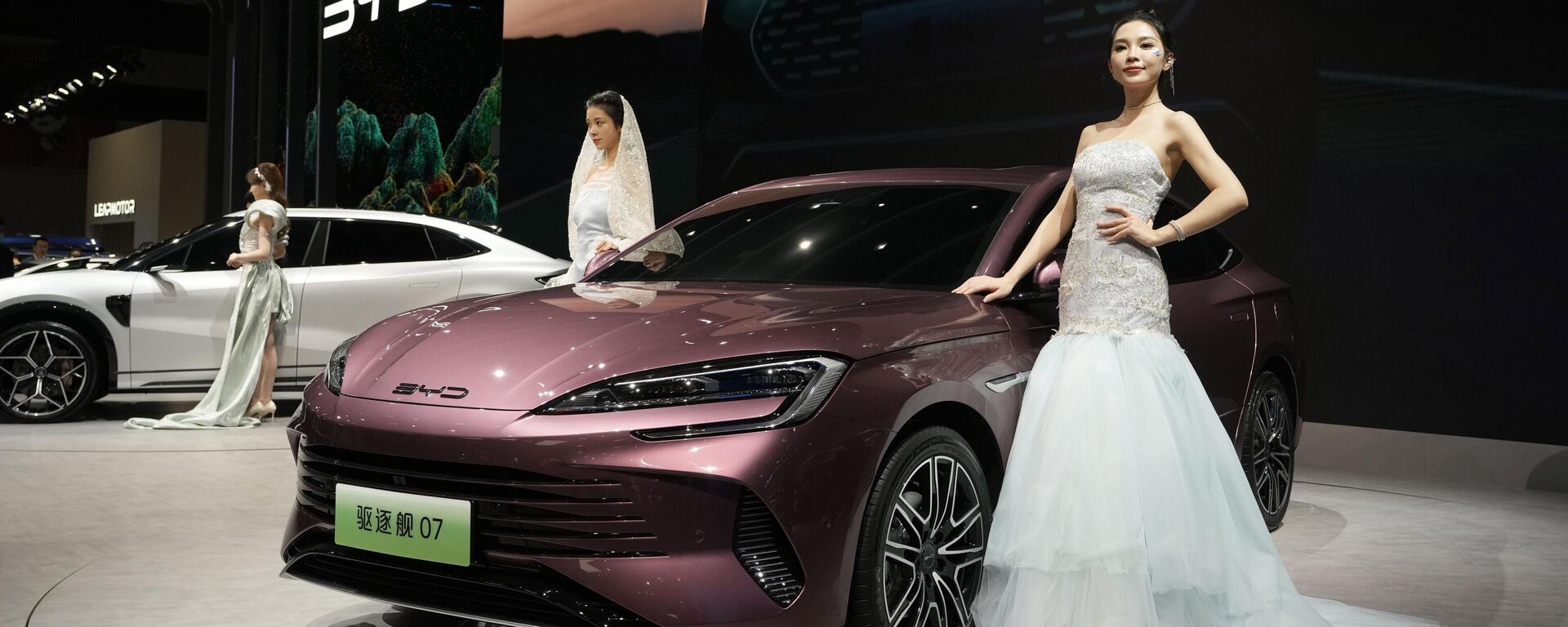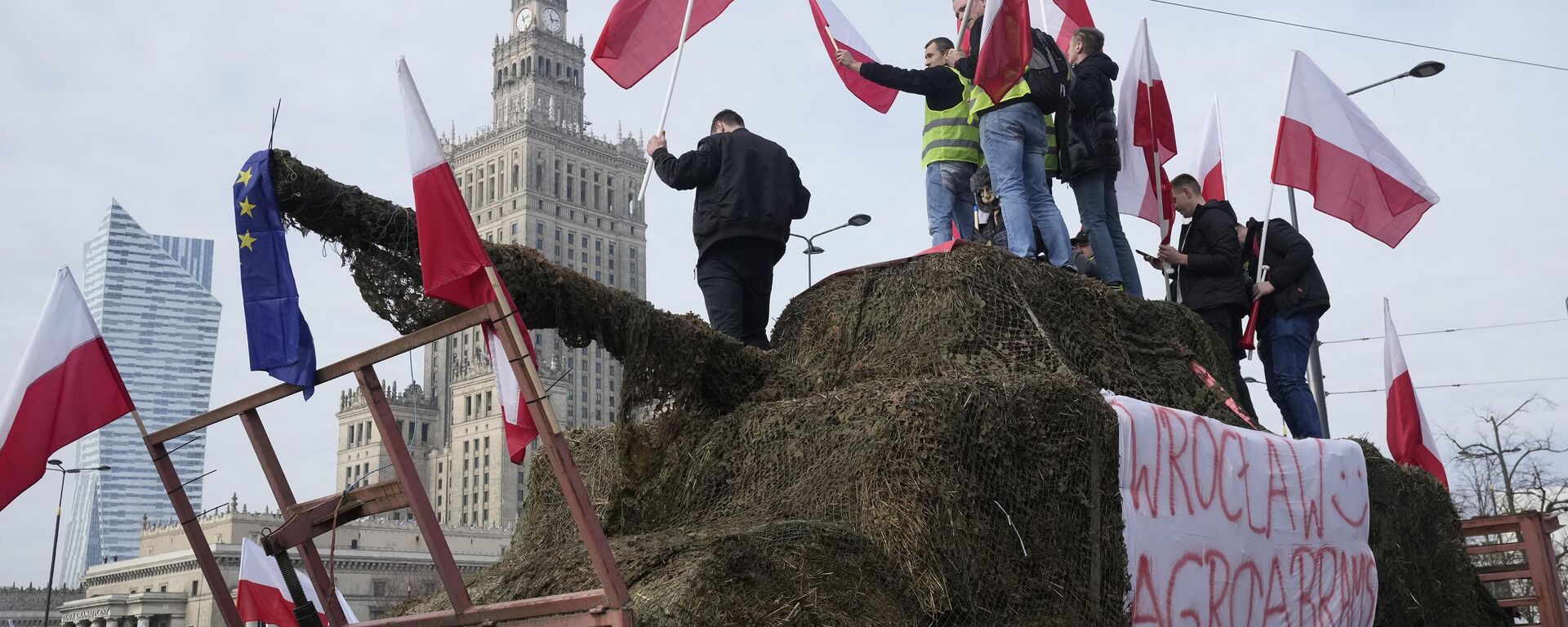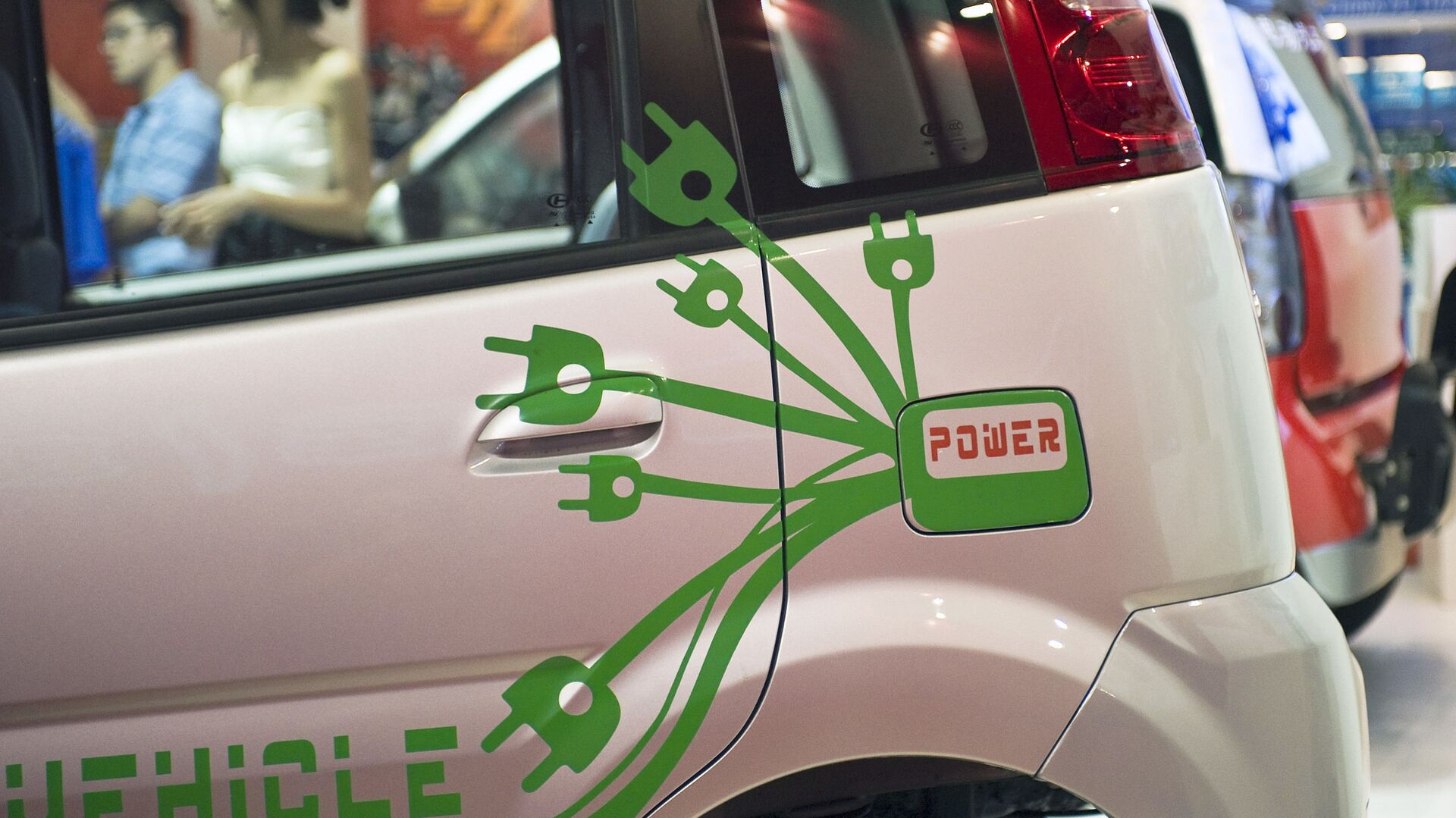https://sputnikglobe.com/20240715/eu-struggles-to-meet-climate-goals-while-waging-economic-war-on-russia-china-1119375894.html
EU Struggles to Meet Climate Goals While Waging Economic War on Russia, China
EU Struggles to Meet Climate Goals While Waging Economic War on Russia, China
Sputnik International
Western militaries generate a substantial amount of global greenhouse gas emissions but are generally exempt from discussions about climate change and the need for shared sacrifice.
2024-07-15T03:38+0000
2024-07-15T03:38+0000
2024-07-15T04:51+0000
world
paul volcker
germany
china
russia
european union (eu)
financial times
green party
nord stream
climate change
https://cdn1.img.sputnikglobe.com/img/107750/08/1077500819_0:222:2998:1908_1920x0_80_0_0_0f38136a4275b5bd59bed1759219b746.jpg
The European Union is failing to meet targets for the production of electric batteries and other green technology amid a lack of political leadership on climate policy, argues an editorial in the Financial Times this weekend.Sandbu acknowledges several broad problems faced by European industry, including technological “handicaps” compared to other countries and difficulties in accessing raw materials and cheap energy. But the author chiefly blames the continent’s political leaders for failing to facilitate market demand to make the development of green tech attractive to the private sector.“They do not believe the political goals will be met,” he writes, arguing EU car manufacturers would innovate in the production of electric vehicles if plans to phase out internal combustion engines over the next decade were deemed credible.In the meantime the economic bloc has taken measures to protect domestic industry, with combined tariffs on Chinese vehicles recently reaching as high as 47.6%.Chinese manufacturers like BYD have significantly innovated in the production of cheap electric vehicles in recent years, offering a variety of options for less than $30,000 and some as cheap as $10,000. Consumers in Latin America and other regions already enjoy access to the inexpensive cars, but trade barriers have kept them out of US and European hands even as political leaders stress the importance of addressing climate change.Recently, controversy has emerged over climate policy across Europe as various interests, led by small farmers, complain they are bearing the economic brunt of the green transition. The continent has been rocked by large protests over heavy taxes on diesel fuel in France and Germany.Berlin’s recent struggles are emblematic of the troubled rollout of green policy. The country’s Green Party, which has grown increasingly fixated on the Western proxy war against Russia, successfully lobbied for Germany’s nuclear plants to be shut down in the years following Japan’s Fukushima nuclear accident. The policy has led the country to increase its reliance on coal-fired power plants to meet its energy needs.Sanctions on Russian energy and the destruction of the Nord Stream gas pipeline have forced Germany to double down on the heavily-polluting technology, while also moving towards restarting some nuclear plants.One 2022 report demonstrated that militaries are responsible for a full 5.5% of global greenhouse gas emissions. The US military is the worst offender, consuming more fossil fuels than any other single institution in the world and generating more greenhouse gas emissions than entire industrialized countries like Denmark and Portugal.Yet discussions about climate change and the need for shared sacrifice exempt the Western war machine as cold war on China and hot war against Russia remain at the top of politicians’ list of priorities.Macroeconomic policy has lessened the appetite for investment more broadly as central banks raise interest rates to stamp out inflation in line with former Federal Reserve chair Paul Volcker’s famous declaration that “the standard of living of the average American has to decline.”Some countries have made impressive strides in the adoption of green tech, Sandbu notes, with electric vehicles making up 83% of new car sales in Norway in 2023. With the US and most European countries lagging far behind, it remains to be seen if political leaders are capable of enacting the necessary policy to reach similar numbers.
https://sputnikglobe.com/20240225/whos-laughing-now-chinas-shrewd-planning-paved-way-for-manufacturing-dominance-1116981963.html
https://sputnikglobe.com/20240228/we-have-become-our-own-enemy-polish-farmers-remarkable-protest-against-europes-self-destruction-1117028033.html
https://sputnikglobe.com/20240713/third-time-the-charm-germany-draws-up-contingency-plan-for-war-1119363879.html
germany
china
russia
Sputnik International
feedback@sputniknews.com
+74956456601
MIA „Rossiya Segodnya“
2024
John Miles
https://cdn1.img.sputnikglobe.com/img/07e8/01/19/1116388787_0:0:1316:1316_100x100_80_0_0_77e70d36afd983012b1c5d38ddb84156.jpg
John Miles
https://cdn1.img.sputnikglobe.com/img/07e8/01/19/1116388787_0:0:1316:1316_100x100_80_0_0_77e70d36afd983012b1c5d38ddb84156.jpg
News
en_EN
Sputnik International
feedback@sputniknews.com
+74956456601
MIA „Rossiya Segodnya“
Sputnik International
feedback@sputniknews.com
+74956456601
MIA „Rossiya Segodnya“
John Miles
https://cdn1.img.sputnikglobe.com/img/07e8/01/19/1116388787_0:0:1316:1316_100x100_80_0_0_77e70d36afd983012b1c5d38ddb84156.jpg
eu climate policy, eu green tech, eu electric battery investments, eu climate targets, eu electric vehicle adoption, cheap chinese evs, military greenhouse gas emissions, climate change
eu climate policy, eu green tech, eu electric battery investments, eu climate targets, eu electric vehicle adoption, cheap chinese evs, military greenhouse gas emissions, climate change
EU Struggles to Meet Climate Goals While Waging Economic War on Russia, China
03:38 GMT 15.07.2024 (Updated: 04:51 GMT 15.07.2024) Western militaries generate a substantial amount of global greenhouse gas emissions but are generally exempt from discussions about climate change and the need for shared sacrifice.
The European Union is failing to meet targets for the production of electric batteries and other green technology amid a lack of political leadership on climate policy, argues an editorial in the Financial Times this weekend.
“Even as leaders are clear-eyed about the central importance of domestic economic strength to their geostrategic independence, they still do not seem to will the means to their stated ends,” wrote Martin Sandbu in the British newspaper. “News that European battery projects are being scrapped or seriously scaled down is an important sign of things going wrong."
Sandbu acknowledges several broad problems faced by European industry, including technological “handicaps” compared to other countries and difficulties in accessing raw materials and cheap energy. But the author chiefly blames the continent’s political leaders for failing to facilitate market demand to make the development of green tech attractive to the private sector.
“They do not believe the political goals will be met,” he writes, arguing EU car manufacturers would innovate in the production of electric vehicles if plans to phase out internal combustion engines over the next decade were deemed credible.

25 February 2024, 23:06 GMT
In the meantime the economic bloc has taken
measures to protect domestic industry, with combined tariffs on Chinese vehicles recently reaching as high as 47.6%.
Chinese manufacturers like BYD have significantly
innovated in the production of cheap electric vehicles in recent years, offering a variety of options for less than $30,000 and some as cheap as $10,000. Consumers in Latin America and other regions already enjoy access to the inexpensive cars, but trade barriers have kept them out of US and European hands even as political leaders stress the importance of addressing climate change.
Recently, controversy has emerged over climate policy across Europe as various interests, led by small farmers, complain
they are bearing the economic brunt of the green transition. The continent has been rocked by large
protests over heavy taxes on diesel fuel in France and Germany.
Berlin’s recent struggles are emblematic of the troubled rollout of green policy. The country’s Green Party, which has grown increasingly fixated on the Western proxy war against Russia, successfully lobbied for Germany’s nuclear plants to be shut down in the years following Japan’s Fukushima nuclear accident. The policy has led the country to increase its reliance on coal-fired power plants to meet its energy needs.

28 February 2024, 03:13 GMT
Sanctions on Russian energy and
the destruction of the Nord Stream gas pipeline have forced Germany to double down on the heavily-polluting technology, while also moving towards
restarting some nuclear plants.
One 2022 report
demonstrated that militaries are responsible for a full 5.5% of global greenhouse gas emissions. The US military is the worst offender,
consuming more fossil fuels than any other single institution in the world and generating more greenhouse gas emissions than entire industrialized countries like Denmark and Portugal.
Yet discussions about climate change and the need for shared sacrifice exempt the Western war machine as cold war on China and hot war against Russia remain at the top of politicians’ list of priorities.
Macroeconomic policy has lessened the appetite for investment more broadly as central banks raise interest rates to stamp out inflation in line with former Federal Reserve chair Paul Volcker’s famous
declaration that
“the standard of living of the average American has to decline.”Some countries have made impressive strides in the adoption of green tech, Sandbu notes, with electric vehicles making up 83% of new car sales in Norway in 2023. With the US and most European countries lagging far behind, it remains to be seen if political leaders are capable of enacting the necessary policy to reach similar numbers.






